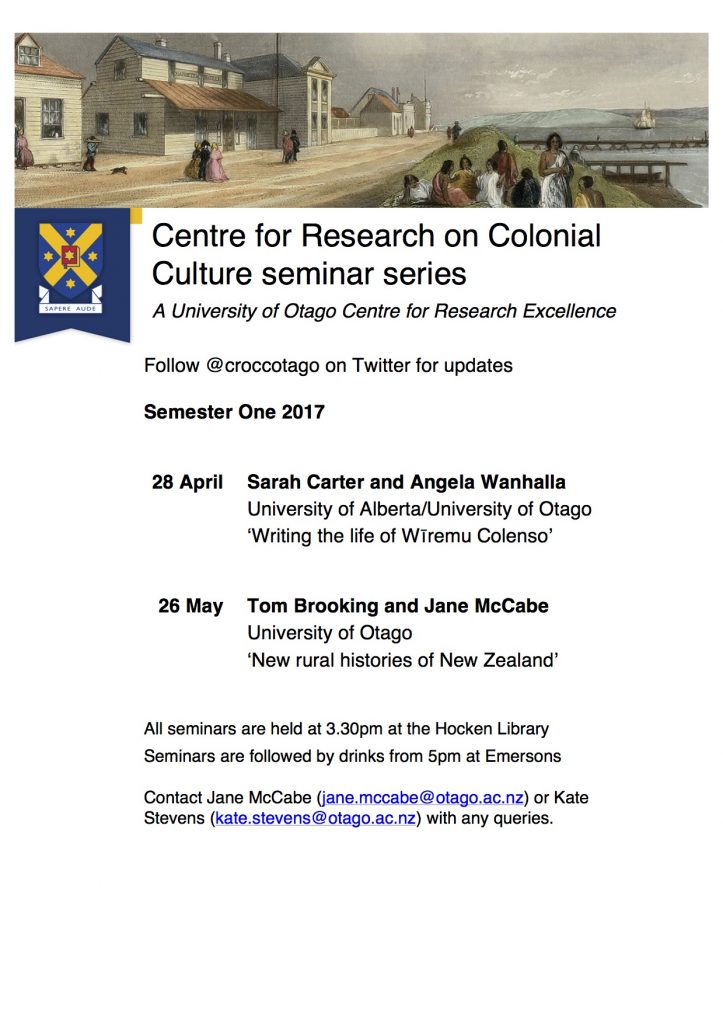Mapping Workshop
Centre member Jane McCabe has had a busy year. In May her first book was published, and officially launched the following month. It’s been well-received and getting some great media attention including a spread in the Dominion Post, as well as on the New Books Network. Jane also started a new project in February.
Rural history is at the heart of her Marsden Fast Start project entitled ‘Splitting up the Farm? A Cross-Cultural History of Land and Inheritance in Aotearoa’. In late June she hosted a mapping workshop based around that project, which was supported by the Centre for Research on Colonial Culture. The one-day workshop brought together experts in rural history, land titles and mapping to discuss best practice in use of maps and land titles in order to help Jane as she works towards the production of effective visual outputs for the project. Jane began the day with a presentation in which she set out the research questions and aims for her investigation of familial land transfer in two districts (Taieri and Hokianga) from 1870 to 1970. This helped set the framework for the workshop and focus discussion on the advantages and disadvantages of land titles for a project about cross-histones of land use and inheritance. In order to foreground the land, and attitudes to it, Jane proposed a survey of land titles/ownership to show change over time, with the aim of collating data for communication on a digital platform.
Participants discussed the value of maps in helping think about the past spatially. One inspiring suggestion was that project participants might be encouraged to draw maps of their farms so that familial and individual approaches to land use could be illuminated, thereby providing a multiplicity of voices to land use that does not rely on official maps and land titles. Personal mapping might also enable social and cultural data to be mapped that might look different to official data, detailing how families members who might not be named as owners in fact worked and used the land. Later sessions discussed land titles and their value as historical sources for mapping land ownership over time and cross-culturally.
The Centre thanks Jane for hosting this event and all the participants for sharing their expertise: Malcolm McKinnon, Michael Roche, Jonathan West, Brian Coutts, Vivienne Cuff, Michael Stevens, Hugh Campbell, Tom Brooking, Michael Stevens and Angela Wanhalla, as well as Karen Craw for kindly showcasing the Hocken’s map holdings relating to the Taieri.
The Centre has been busy hosting a number of workshops this year, and have many more on the horizon. There’s a whaling history symposium in late June 2018 in Honolulu, for instance, along with plans for an event on Māori writing in November 2018, as well as a possible workshop on rural history in late 2018. Watch this space for further details.
New Rural Histories of New Zealand
Prof. Tom Brooking and Dr. Jane McCabe will present at the next CRoCC research seminar on Friday 26 May on aspects of New Zealand’s rural history.
In early June, Tom and Jane will present at the annual meeting of the Agricultural History Society on the theme “Who is a farmer? Regional identity and rural culture”.
They will present their papers at Friday’s seminar in preparation for the Agricultural History Society Conference. They are very keen to get feedback on their presentations.
Their talks will take place in the Hocken Seminar Room on Friday May 26th starting at 3.30. Coffee, tea and snacks will be provided, and all are invited to come for social drinks at Emerson’s afterwards.
All are welcome!
Prize Nomination for Visiting Scholar
The Centre for Research on Colonial Culture is pleased to learn that Professor Sarah Carter’s (University of Alberta) most recent book, Imperial Plots: Women, Land, and the Spadework of British Colonialism on the Canadian Prairies (University of Manitoba Press, 2016), has been shortlisted for the Sir John A. MacDonald Prize, which is awarded annually by the Canadian Historical Association to the “non-fiction work of Canadian history judged to have made the most significant contribution to an understanding of the Canadian past.” Also on the list is another good friend of the Centre, Adele Perry (University of Manitoba), who is nominated for Colonial Relations: The Douglas-Connolly Family and the Nineteenth-Century Imperial World (Cambridge: Cambridge University Press, 2015). Congratulations to Sarah and Adele!
Those interested in the entwined histories of gender, race and colonialism will be able to hear Professor Carter speak on these topics when she visits the University of Otago from 24 April to 14 May as a William Evans Fellow. While in Dunedin she will give a number of research talks, as well as a public lecture at Toitū Otago Settlers Museum on Sunday, May 7th. We’ll post details of these presentations very soon.


